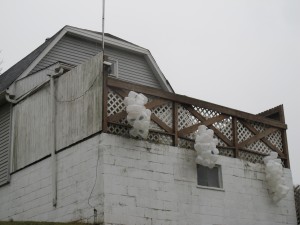Pa. regulators document 209 cases of water damage from oil and gas operations

Susan Phillips / StateImpact Pennsylvania
Empty water jugs used to haul clean water hang from a house in Washington County. Residents suspected nearby gas drilling as the culprit. The DEP investigation concluded drilling was not to blame.
Pennsylvania environmental regulators have documented 209 cases where oil and gas operations negatively impacted water supplies since late 2007, the Pittsburgh Post-Gazette reports.
The new tally from the state Department of Environmental Protection comes as Pennsylvania’s Auditor General’s Office releases a much-anticipated report faulting the agency for its response to drilling-related water complaints.
The DEP plans to post information about the incidents in a spreadsheet on its website by the end of the month – a first for the department.
The Pittsburgh Post-Gazette obtained an early copy of the document:
The spreadsheet lists the 209 affected water supplies by county, municipality and the date regulators concluded that activities related to oil or gas extraction were to blame for contaminating or diminishing the flow to a water source.
The document does not disclose property owners’ names or addresses and it does not detail which companies that were deemed responsible for the damage, what caused the disruptions or what pollutants were found in the water.
DEP’s deputy secretary for oil and gas management, Scott Perry, said the agency intends to enhance the spreadsheet by adding links to the letters or orders related to each case at some point, which should reveal more information about how water was affected.
Those documents, though public records, have not always been so accessible to citizens or the media.
In a 2012 open records case, the Commonwealth Court criticized the DEP for poor record-keeping and forced the agency to turn over documents related to water contamination to the Scranton Times-Tribune.
The spreadsheet obtained by the Post-Gazette shows that cases of drilling-related water impacts were spread across the regions where development occurs from the Northern Tier to the southwestern part of the state, with the highest number of incidents in Bradford County (48) and the lowest in Fayette County (1).
This story and headline have been updated to reflect the following correction: The DEP has documented 209 cases not just of water contamination, but also of diminution or reduced flow.
















